Helen H. Moore's Blog, page 727
July 6, 2016
She brought this on herself: Clinton’s mishandling of the email scandal will — and should — hurt her
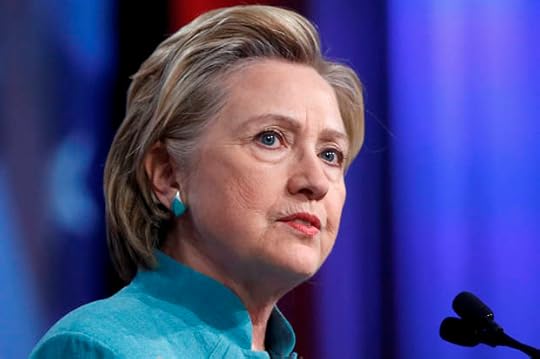
Hillary Clinton (Credit: Reuters/Chris Bergin)
So the great email scandal of 2016 reached an apparent climax on Tuesday, and the results were utterly predictable: Hillary Clinton likely won’t be indicted, after the FBI’s recommendation to not prosecute. Legal experts saw this coming. The relevant statutes are sufficiently expansive that almost anyone could be charged under them. A case like this had little chance of ending in prosecution. Those who expected a different outcome were likely blinkered by anti-Hillary sentiment.
There are two ways to look at this from our post-FBI perch. On the one hand, this story was propped up by media outlets and right-wingers who knew how it would end but needed a dramatic narrative to push. The facts were out there. Barring some shocking revelation, criminal charges were always a pipe dream. Republicans understood this, but pretending otherwise accomplished a couple things: It whipped their base into a frenzy and set up a new outrage narrative about how “rigged” the system is. Now that Comey said what everyone knew he would say, Republicans will spend the next several months decrying the faux injustice.
The story can also be seen as an unambiguous indictment of Clinton’s judgment. None of this needed to happen. Clinton brought this on herself, and as is often the case, the cover-up surpassed the crime. The bottom line is that Clinton lied about what she did and why she did it. She said she never sent or received classified emails. She did. She then backtracked and said she never knowingly sent or received any classified information. She did. She said her private server didn’t leave her and the classified information vulnerable to foreign hacks. It did.
FBI Director James Comey was quite clear about this in his remarks on Tuesday: “From the group of 30,000 e-mails returned to the State Department, 110 emails in 52 e-mail chains have been determined by the owning agency to contain classified information that was Top Secret at the time they were sent; 36 chains contained Secret information at the time; and eight contained Confidential information.” While Comey carefully parsed his words, saying they “did not find clear evidence that Secretary Clinton or her colleagues intended to violate laws governing the handling of classified information,” he added that “there is evidence that they were extremely careless in their handling of very sensitive, highly classified information.”
Comey had to put it this way. It’s near-impossible to prove intent. But saying Clinton was “extremely careless” and that “any reasonable person…should have known” amounts to saying she knew what she was doing. It’s fairly obvious: Clinton was determined to protect her privacy and skirted the rules in order to do so. There really isn’t another plausible interpretation. The planning and coordination it took to execute this doesn’t happen without “intent” of some kind. Clinton is a very smart and very experienced politician – does anyone believe she didn’t understand the risks involved?
Although the scandal is officially dead, it will live on through November. House Speaker Paul Ryan has already announced his plans to hold hearings about the FBI’s decision-making process, and that’s just the beginning. Republicans will pound their talking points over and over and over again. And they should: it’s smart politics. But the point is that Clinton gifted those talking points. Without this story, what would the GOP talk about? Benghazi? That line of attack died a public death when Clinton testified before Trey Gowdy’s farcical committee. Apart from dredging up conspiracy theories from the 90s, there really isn’t much to chew on for Republicans. Of course, they’d invent non-crimes in order to pin them on Hillary, but that wouldn’t stick.
But the email story does. And here’s why: Fair or not, Americans don’t trust Clinton. A New York Times/CBS News poll in May found that 64 percent of voters said “no” when asked if they believed Clinton was “honest and trustworthy.” This is one of the few questions on which she consistently trails Trump, a man who lies with breathtaking alacrity. Clinton’s handling of the email server isn’t the epic crime Republicans need it to be, but it does speak to something fundamentally true about Clinton: She’s excessively secretive and borderline paranoid.
I wrote earlier this year that Clinton’s guardedness is almost pardonable. The recipient of GOP attacks for decades (many of which were deeply personal), she is obsessed with privacy. But her defensive posture has become self-defeating. And her inability to correct course when it’s clear she erred is maddening. As this Washington Post report makes painfully clear, Clinton repeatedly misrepresented the facts in an effort to protect her image. She had to know – or should have known – this would eventually backfire.
If there were anyone other than Donald Trump on the other side, this would be cataclysmic for the Clinton campaign. This election will reduce to questions about basic fitness and competence. In many ways, it’s still a simple case to make: Trump isn’t fit for office. But Clinton’s judgment in this case is so irrefutably bad that it undermines her argument just enough to make things interesting for Republicans. Every other attack ad between now and November will feature the words “extremely careless,” and it will resonate. Clinton has made her experience and judgment her defining virtues – this calls both into question.
And that’s on her.
July 5, 2016
Meet North Korea’s perfect family: Totalitarianism, Trump and the politics of non-thought

Zin-mi, the eight-year-old North Korean girl featured in "Under the Sun" (Credit: Icarus Films)
North Korea or, to use its official name, the Democratic People’s Republic of Korea, is listed among the producing nations of Russian director Vitaly Mansky’s profoundly disturbing documentary “Under the Sun.” If officials of North Korean dictator Kim Jong-un’s regime could undo that relationship after the fact, they definitely would. But now the movie exists and they’re stuck with another international embarrassment. You almost have to feel bad for the clueless party apparatchiks of the DPRK, who once again find themselves playing the role of Charlie Brown while some foreign filmmaker yanks away the football. They’ve been punk’d more often than Ashton Kutcher’s poker buddies. Of course we are talking about the most paranoid, most isolated and most nightmarish country on earth, by near-universal acclamation. I did say “almost.”
Properly understood, I think the lessons of “Under the Sun” go far beyond the tragic and idiotic delusions of North Korea’s nightmare state, and that those lessons have direct application in Mansky’s country, and in ours. Yes, I really am going to work this around to Donald Trump, who can only dream of the kind of brand management and media control exercised by North Korea’s rulers, but it pursuing a similar strategy in a different context.
You will definitely feel bad, if not heartbroken, for the 8-year-old star of this self-deconstructing propaganda film, an adorable child named Lee Zin-mi who is about to join the Korean Children’s Union, the Kim regime’s prestigious youth wing. After extensive negotiations, Mansky agreed to make a film about Zin-mi and her family that would be scripted by his North Korean partners, and I guess they thought they had him surrounded. Like all foreign visitors, he was monitored 24/7 and shot only in pre-approved and carefully staged locations. He also agreed to show his footage to government censors before he left the country. He did not, however, tell them how he planned to use it when he got home.
Why the Koreans allowed Mansky to film Zin-mi struggling to stay awake during an aging war veteran’s tedious tale — focused, as all such stories must be, on the inspiration provided by the late Kim Il-sung, North Korea’s “Great Leader” — I have no idea. In the very last scene, we watch Zin-mi fighting back tears under criticism from a demanding dance teacher, a scene so universal and so free of ideology (until its chilling final seconds) that it makes the barriers between her and us appear to melt away.
I suppose it simply didn’t occur to the DPRK censors that all the extra footage in Mansky’s camera — the outtakes and retakes, the extensive coaching before and during every scene — would make it clear that the entire spectacle was a feeble fraud. Zin-mi and her parents don’t really live in the comfortable Pyongyang flat seen in the film, and do not eat lavish traditional Korean lunches every day. Like the war veteran and Zin-mi’s robotically upbeat teacher and everyone else we encounter, they are performers, dutifully following a script. Zin-mi’s parents hold different and more “exemplary” jobs in the film than in real life. (Her father, who is apparently a reporter for a government newspaper, becomes a production engineer at a fabric plant.) In one of the few directorial interventions, Mansky makes clear that he doesn’t know whether Zin-mi really attends the elite school in the movie, or whether she and her parents even live together. (Many adults in North Korea live in work barracks; many children live at school.)
Perhaps some viewers will find it tempting to mock the vacuous self-importance of a society that feels like Orwell’s “1984” redesigned by morons, but I found nothing even remotely amusing about “Under the Sun.” There’s a terrible wonder in this rare glimpse inside a country that has tried to empty itself of all thought, all commerce and all civil society — of pretty much everything except an especially lame version of hero worship and despotism. And whatever you make of the 19th and 20th-century legacy of socialism, an idealistic faith that came badly unglued (but may not quite be dead, as Bernie Sanders has showed us), it’s unspeakably tragic to see it reduced to a fifth-rate parody like this. North Korea’s leadership class barely bothers to mention “Communism” these days, and once-venerated figures from the past, like Marx and Lenin, have been expunged to focus on the greatness of the Kim dynasty, now in its third generation. (Kim Jong-un is the “Respected Leader,” which seems like a downgrade from his dad the “Dear Leader” and grandpa the “Great Leader.” What comes next? The Tolerated Leader? The Viewed With Mixed Emotions Leader?”
North Korea presents the most glaring possible example of a society based on non-thought, a society where all critical thinking is replaced by conditioned dogmatic responses. (From the wary, haunted constitutionally cautious expressions of the citizens we see in “Under the Sun,” I would say it’s not working all that well.) It’s easy to point fingers at the DPRK because its version of non-thought is so bizarre and so cut off from the rest of the world. But the conflict between thought and non-thought can be found everywhere, and the alluring idea that non-thought is the most liberating and revolutionary form of thought — an idea epitomized by North Korea but hardly limited to it — is riding a rising tide. Many of the oppositions we think we perceive in the world, between “left” and “right” or between “terrorism” and “freedom,” are flawed metaphors for this deeper problem.
In Zin-mi’s school, she spends an entire morning memorizing a mythological tale about the young Kim Il-sung bombarding rich landowners with rocks and convincing his comrades that such people were “scoundrels” and traitors who had sold the country to Japanese imperialists. Maybe there is some nugget of actual history beneath that story, but that part doesn’t matter. It is “true” in exactly the same sense as the story about George Washington and the cherry tree, or the one about Donald Trump being a successful businessman who “gets things done,” rather than a second-rate con man and TV personality.
If you’re out there right now composing a tweet about how outrageous it is to compare Trump to the North Korean dictator when it’s Hillary who is the real socialist and who wears Kim Jong-un jumpsuits, just stop it. That’s non-thought, and it has nothing to do with my argument. I’m no fan of Hillary Clinton and I agree that her wardrobe has an odd Pyongyang vibe. But every time we insist on viewing politics as a zero-sum equation of Democrats and Republicans, or viewing the world as a binary contest between “Islam” and “the West,” with no clear sense of what those words mean, we are surrendering to non-thought. Trump has risen to prominence on ideas that are not ideas and thought that is not thought. He faces obstacles that North Korea’s ludicrous dictators do not face, because in our society thought is not yet illegal. Trump is also dangerous in a way the Kim dynasty can never be, because he has emerged as the perfect avatar of a historical moment, shaped by a political culture where thought is widely seen as unnecessary, uncool and hopelessly old-fashioned.
“Under the Sun” opens this week at Film Forum in New York and Facets Cinémathèque in Chicago. It opens July 15 in Los Angeles and Toronto and July 29 in San Francisco and Wilmington, Del., with other cities and home video to follow.
Pop culture still fails queer people: Sanitizing LGBT romance is a tradition Hollywood can’t seem to break
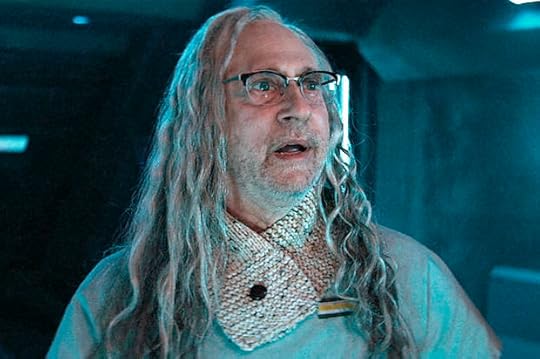
Brent Spiner in "Independence Day: Resurgence" (Credit: 20th Century Fox)
Your partner has been in a coma for 20 years. Because you happen to be a doctor in the hospital in which he is housed, you have spent that entire time taking care of his every need—cutting his beard, bathing him, and making sure the situation doesn’t turn into “Million Dollar Baby.” One day he abruptly awakes, and the moment is startling and emotional. Do you:
share a sweet, tender kiss
hug
exchange a hi-five
give him a handshake and a cigar?
In “Independence Day 2,” the answer is anything but 1.
Roland Emmerich’s long-awaited follow-up to his 1996 aliens-blow-up-the-White-House disaster flick picks up two decades where the original left off. You might remember Dr. Brackish Okun (Brent Spiner), the wild-eyed scientist Captain Hiller (Will Smith) and President Whitmore (Bill Pullman) meet at Area 51. It’s assumed that he died in the first installment, after being used as a human puppet by an alien, but he managed to survive. John Storey (who had a bit part in the previous feature) plays Dr. Isaacs, the loving physician who has stayed dutifully by his partner’s side.
Emmerich, who is openly gay, teased the debut of the franchise’s first gay couple in the weeks leading up to its premiere. “We don’t make a big deal out of it,” the director said. Watching the film, though, it would be easy to mistake the two men as little more than good friends; the closest the two men get to intimacy is discussing knitting and orchids. (“Who’s going to make sure you wear your pants in the morning?” one asks.) The Guardian’s Ben Lee writes that the scene is depicted with an “embarrassing Hays Code coyness.”
When it comes to straight couples, both “Independence Day” films aren’t nearly as shy. Before Hiller goes off to save Earth from alien invasion in 1996, he passionately locks lips with Jasmine, the stripper with a heart of gold played by Vivica A. Fox. (Fox and Smith even won the MTV Best Kiss Award.) Emmerich recreates that moment in the sequel after hottie orphan fighter pilot Jake Morrison (Liam Hemsworth) returns home after kicking extraterrestrial butt. Whitmore’s daughter (Maika Monroe), who also happens to be Jake’s girlfriend, runs toward him for a “welcome home” smooch. It’s reminiscent of the famous Alfred Eisenstaedt photo of a sailor kissing a nurse in Times Square, celebrating the end of World War II and the defeat of fascism.
You can blame the double standard on Hollywood homophobia, and you wouldn’t be wrong. But if “Independence Day 2” isn’t into equal opportunity PDA, it’s both reflective of an industry that’s struggling to depict the lived realities of LGBT people and a public that too often remains uncomfortable with the sight of two men kissing. While America has made enormous strides with it comes to legal recognition for same-sex couples, queer intimacy remains shockingly taboo. That stigma has toxic effects—both for cinema and society at large.
John Schlesinger’s “Sunday Bloody Sunday” is often credited as the first movie to show two men affectionately kissing on screen. There are, however, earlier examples of same-sex intimacy. The Cecil B. DeMille silent picture “Manslaughter” shows two women embracing during a Roman orgy. In 1929’s “Wings,” a man comforts his friend, stroking his hair and kissing his face, as he is dying. But “Sunday Bloody Sunday” brought what was often portrayed as subtext to the fore: Daniel Hirsch (Peter Finch), a Jewish doctor, is involved in a love triangle with a bisexual bohemian sculptor (Murray Head). Hirsch is notable as one of the few gay characters of the time who is happy and successful, portrayed without remorse or guilt about his sexuality.
The landmark film’s matter-of-fact portrayal of same-sex relationships reportedly scandalized audiences. Critic R.D. Finch remembers, “I recall seeing the movie in a theater during its first run, when the sudden—and plainly erotic—kiss between Peter Finch and Murray Head a few minutes into the film had much the same galvanic effect on the audience as Sissy Spacek’s hand popping out of the grave at the end of ‘Carrie’ a few years later: nearly the entire audience reacted collectively with a gasp of shock and surprise.”
If films like “Reflections in a Golden Eye” and “Suddenly Last Summer” intimated their characters unspoken longings, television would struggle to make those desires overt. The first same-sex kiss on television was in 1991 on “L.A. Law,” between C.J. Lamb (Amanda Donohoe) and Abby Perkins (Michele Greene). According to Greene, the brief peck was nothing but a sweeps week stunt—and it never resulted in a real relationship being developed between the two women. “Roseanne” would follow a few years later by partaking in its own lady-on-lady action, but the kiss between Barr and guest-star Mariel Hemingway is played for laughs. Roseanne even licks her sleeve after getting her first taste of the love that dare not speak its name.
The short-lived series “Hot l Baltimore,” produced by Norman Lear, gave us TV’s first gay couple back in 1975, but it wasn’t until 2000 that two men finally got their turn on the small screen: a brief Jack McPhee (Kerr Smith) and Ethan (Adam Kaufman) on “Dawson’s Creek.” Jack travels to Boston to have his “Say Anything” moment with Ethan, the college student he fell for during the WB drama’s second season. But after a short embrace, Jack discovers that the object of his affection is already spoken for. Ethan has a boyfriend.
It would seem that we’ve come a long way since CBS ordered “Picket Fences” to nix a lesbian kiss in 1993 over fears that it would alienate the show’s target audience. While shows like “Empire” and “Glee” have unapologetically featured same-sex love, “How to Get Away With Murder” became the first ever primetime show to feature interracial analingus in 2014. Freeform aired the youngest gay kiss in TV history on “The Fosters,” between 13-year-old Jude (Hayden Byerly) and his friend, Connor (Gavin MacIntosh), but it wasn’t without controversy. When Ryan Murphy’s “The New Normal” (about a gay couple who decide to adopt) debuted in 2012, it was boycotted, with some stations refusing to air it. Facing that backlash, it took a season and a half for “Modern Family” to let Mitch and Cam kiss.
More recently, a PSA for the We the Brave campaign, which seeks to educate gay and bisexual men about sexual health, was widely protested in South Africa. The TV spot was the first ever to feature two men sucking face. According to the country’s channel 24, reactions from outraged viewers ranged from “this is offensive and disgusting” to calling the commercial “a step too far.” One viewer protested, “Explain this to my daughter.” It’s extremely similar to the public backlash when former pro footballer Michael Sam kissed his boyfriend live on ESPN after finding out he was the first gay player drafted in the NFL.
The controversy around Sam’s emotional PDA illustrated just how uncomfortable many Americans remain with seeing physical intimacy between queer people, especially men. According to a 2014 study from the American Sociological Review, 45 percent of respondents reported being comfortable with seeing two men kissing—even on the cheek. Thirty-eight percent of those surveyed in an Indiana University report were likewise made uneasy at the sight of men holding hands. Just 22 percent of respondents in that survey thought it was “acceptable” for a same-sex couple to French kiss in public, as compared to the 50 percent who thought the same display would be OK if the couple were heterosexual.
This isn’t just an issue for audiences who long for better LGBT representation at a time when pop culture continues to fail queer people. A study from USC Annenberg published in August showed that queer characters are “virtually nonexistent” in Hollywood’s top movies: Between the years of 2007 and 2014, just .4 percent of characters with speaking roles were LGBT-identified. A GLAAD report from 2016 showed that the number of movies with queer characters actually decreased last year. Even when gay characters are in the picture, movies like “The Imitation Game” and “Philadelphia” often treat their romantic lives with kid gloves.
This double standard also affects queer people’s everyday realities. On June 12, an armed shooter gunned down 49 people at Orlando’s Pulse nightclub, a gay bar that acted as a crucial safe space for Florida’s LGBT community. On the evening of the attack, Pulse was hosting its monthly Latin Night. According to the gunman’s father, he was angered after seeing public displays of affection between men. “We were in Downtown Miami, Bayside, people were playing music,” Seddique Mateen told press. “And he saw two men kissing each other in front of his wife and kid and he got very angry.” The result of that rage and possible internalized homophobia, as reports suggest that the shooter may have been struggling with his sexuality, was the deadliest mass shooting in U.S. history.
Across the country, LGBT people staged a worldwide kiss-in on social media in response to the Orlando tragedy—with the hashtag #TwoMenKissing trending on Twitter in the days following the shooting. Gay and bisexual social media users posted photos of themselves embracing their partners, and the New York Times called it “an act of love and activism.” Jon Collins, who works as a television producer in Los Angeles, told the Times that he wanted to challenge the homophobic thinking that inspired the shooter. “It’s natural, it’s normal, it’s just love,” he said.
Roland Emmerich always said that “Independence Day 2” would be a small step forward for LGBT characters. “You start small and then you get bigger and bigger and bigger, and one day you have a gay character as the lead and nobody will wonder at it no more,” the director told The Hollywood Reporter back in 2015. His film, however, depicts a world that has come together after a devastating attack to make enormous progress. In “Independence Day 2,” space travel looks like the intergalactic ballet of “2001: A Space Odyssey” and flying cars dot the sky (ala “The Jetsons”). As the film explains, studying alien technology led to incredible leaps forward in human development, as well as an unprecedented era of peace.
It’s extraordinarily telling that we can envision a world where war and conflict have been resolved, but not one where two men can do something that should be so simple.
Life of an author on the internet: “Someone on Goodreads took the time to write out ‘Meh’ as their whole review”
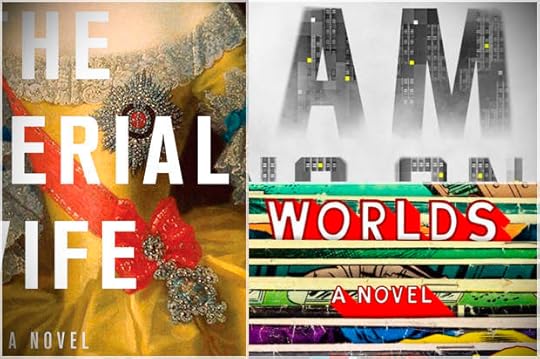
For July, I posed a series of questions — with, as always, a few verbal restrictions — to five authors with new books: Jennifer Armstrong (“Seinfeldia”), Patrick Flanery (“I Am No One”), Hannah Pittard (“Listen to Me”), Bob Proehl (“A Hundred Thousand Worlds”), and Irina Reyn (“The Imperial Wife”).
Without summarizing it in any way, what would you say your book is about?
PITTARD: Early on a character says, “Fuck the internet.” That same figure soon realizes he’s married to a loser. Additionally, the book is about paranoia, the Riso-Hudson Enneagram Type Indicator (RHETI), marriage, secrets, Xerox machines, cloud factories, wind power, trust, St. Augustine, desensitization to violence, Mesopotamia, anonymity, and highways at night.
ARMSTRONG: The impossibility of predicting success in mass culture, how a show can continue to infiltrate culture, and how that plays out in everyday real life.
REYN: What happens in a marriage when a wife is more powerful than her husband? In order to answer this question, it seems that immigrants in Queens and New Jersey, Catherine the Great, Russian oligarchs, Imperial relics and top auction houses had to all get involved.
PROEHL: How the fictions we share with each other define who we are and who we want to be. The intensity of the love between parents and kids, and the surprising emotional savvy of those kids. Being a parent who is also a person. Unabashedly loving things that are weird or uncool.
FLANERY: It’s about a man whose life is catching up with him, about troubled relationships between parents and children, the pain of leaving home and coming back to find that nothing is quite how you remember it. It’s about memory and desire, about film and other kinds of watching: voyeurism, surveillance, and the death of privacy. It’s about realizing that one mistake can ripple through life until it threatens to sink the whole ship. And it’s about transcending all of the dirt of the past and imagining, in the end, a new way of living.
Without explaining why and without naming other authors or books, can you discuss the various influences on your book?
PROEHL: Watching the end of Richard Donner’s “Superman” with my then eight-year-old stepson. Ziggy Stardust-era Bowie and Jim Starlin’s “Warlock” comics. The twenty-minute walk from Times Square up to New York City Comic Con. My wife’s time in a doctoral program while raising a small child. Schlepping longboxes of comics to suburban malls for a comic book dealer in the summer when I was a kid.
FLANERY: Miles Davis, walking the High Line in New York and looking into people’s apartments, drinking bad coffee on MacDougal Street in Greenwich Village, the Arab Spring, Edward Snowden, Florian Henckel von Donnersmarck’s “The Lives of Others,” listening to an academic paper at NYU on Joshua Oppenheimer’s “The Act of Killing,” ordering vegetarian pho from a grungy takeout place in Vancouver and eating it in an overpriced hotel staffed entirely by Russians, dreaming about David Hemmings’s white jeans in Antonioni’s “Blow-up.”
ARMSTRONG: Mary Roach, Susan Orlean, “Seinfeld”—particularly Larry David—and maybe at least a few fleeting thoughts about Beckett?
PITTARD: On the RHETI, to an unhealthy degree, I am an Achiever. At work, we have been asked to stop using the copier. I worry that the internet is dulling our brains, our capacity to make important distinctions, our ability to be in awe of the world. Marriage is a terrifying institution. Is it possible ever to know another person?
REYN: The great adventure that is marriage, my dear friend’s job, Hillary Clinton, an eternal tussle with ambition, the beautiful and ominous city that is Moscow.
Without using complete sentences, can you describe what was going on in your life as you wrote this book?
REYN: Seriously considering becoming a life coach.
ARMSTRONG: Gratitude, luck, freelance writing, debt, almost feeling like I’ve figured out how to write a book, lots of interviews with very funny and intimidating people, trips to Los Angeles, and lots of TV.
PITTARD: Chicago to Lexington; Visiting to Assistant; apartment to house; landlord to mortgage; ten expected feet of snow to ten unexpected feet of snow; overwhelming feelings of contentment leading to intense bouts of fear and depression; earaches, brand-new mouth guard, leaky roof, Exploding Head Syndrome, self-installed alarm system, Vitamix.
PROEHL: Quitting my bookselling job. Artist residency in central New York. Isolation. Occasional hiking. Vegetarian diet. Spotty internet. Uninformed birdwatching.
FLANERY: Teaching; commuting on four different forms of public transport; a growing sense of alienation from London, where I’ve lived since 2010; trying to start a family with my partner; wanting to move back to New York, which I left in 2001; fearing that I’ll never own property; worrying about aging parents who live across an ocean.
What are some words you despise that have been used to describe your writing by readers and/or reviewers?
FLANERY: “Thriller.” I don’t have a gripe with thrillers, but I don’t think anything I’ve written could be mistaken for one, at least not in strict genre terms. A student in South Africa who was studying my first novel, “Absolution”, wrote to tell me it was “monotonous” and implored me to “make a YouTube Channel” to explain it. Not just a video. A whole channel.
PROEHL: Kirkus said the book occasionally “lurches into overwrought, look-at-my-MFA-style writing.” I don’t have an MFA to look at, so that hurt. Someone on Goodreads took the time to write out “Meh” as their whole review. I admire that dedication to sharing your indifference with the whole Internet forever.
REYN: Unlikeable protagonist. This has to do with reading fiction through the lens of life rather than the lens of fiction.
PITTARD: Accessible, inaccessible, baffling, shoddy, and my all-time favorite complaint (courtesy of an Amazon review): “She writes a little too well, and that is what bothered me some about this novel.”
ARMSTRONG: Ugh, you’re trying to get me to read my bad reviews, aren’t you? How about “bogs her story down a bit with too much detail?” Probably not the worst thing anyone’s ever said, but infuriating as a journalist and nonfiction writer who worked hard to get that detail.
If you could choose a career besides writing (irrespective of schooling requirements and/or talent), what would it be?
ARMSTRONG: Irrespective also of money: coffeehouse singer.
REYN: The busy magazine editor as portrayed on film. I want the whole mise-en-scène: the oversized coffee cup, the rush to important meetings, the white architect’s desk before a soaring midtown Manhattan view, the pencil skirt, the wise-cracking assistant.
PITTARD: In my heart, I’m a comedian—not a successful comedian, but one who is both sad and deeply committed to the art.
FLANERY: Architect, or visual artist (painter), or film director, or psychoanalyst. A job that somehow combined all four careers would be ideal. In other words, Werner Herzog, except I’ve heard he doesn’t believe in psychoanalysis.
PROEHL: If money were also no object, I’d go back to bookselling or working in a record store. Being around people who are excited about completely non-essential things.
What craft elements do you think are your strong suit, and what would you like to be better at?
PROEHL: Dialogue and description are probably my strong suits, and I’m good, or maybe just obsessive, about structure. I like doing little moments and quiet bits. I’d like to be a better plotter, or the kind of writer who has massive emotional moments where if it were a musical, it’d be the scene where everyone is singing interconnected songs as loudly as they can at the same time. Or chase scenes or something. I didn’t for this book, but I also write excellent cats.
FLANERY: I’m not convinced it’s possible to be objective about this. I feel confident about structure, I think I have a good ear for dialogue, and I tend to trust in my instincts about the balancing and rhythm of a sentence, letting it unwind over a series of sometimes unlikely sub-clauses. I sometimes wish I could write radically compressed prose, but I’m coming to accept that minimalism is not my mode, at least for now.
REYN: Because of my nostalgic sensibility, I’m best with setting and observation, bringing a particular period to life in a fully immersive way. I have this paranoia that every character sounds like me so I take it easy on the dialogue.
PITTARD: I hate my vocabulary. I love my understanding of grammar and punctuation. I should have read less Faulkner when I was younger.
ARMSTRONG: I’m a good reporter thanks to a few years of torture at local newspapers, and I know my subject matter, TV business and history. I’d like to be better at the poetry of writing—metaphors, that kind of thing.
How do you contend with the hubris of thinking anyone has or should have any interest in what you have to say about anything?
ARMSTRONG: Easy! I write about television shows with a proven audience. As a nonfiction writer, I’m forced to take care of this at the proposal stage. Then I do lots of work to research my topics. By the time the book is out, I’m pretty confident. I embrace my hubris. I earned it.
PROEHL: It wasn’t something I worried about writing this one, because I was still writing for myself and friends who were socially obligated to feign interest. I was getting affirmation here and there in the form of fellowships and residencies, which kept the hubris fed. Now I’m writing a second book in the shadow of a first one that hasn’t even come out, and I’m freaking out all the time. It can get paralyzing, but I’m still enjoying the work enough to keep moving forward on it.
FLANERY: I’m in a constant battle against self-doubt. It doesn’t help having a father who said, after I’d been unemployed for more years than I want to recall and my first book finally sold to publishers, ‘How will you stay humble?’ Family sometimes works overtime to keep the ego in check, but it doesn’t make writing fiction any easier.
REYN: For me, writing flows best when I convince myself I’m the book’s only reader. Now that it’s out, let’s just hope that doesn’t turn out to be true!
PITTARD: I’m writing to make sense of the world. I’m doing this for me and, to a certain extent, also for you, if you’re interested. If you’re not interested, I get it. After all, Faulkner exists, Spark exists, Maxwell and Lessing and Roth and James and Hawthorne and Barthelme and Beattie exist. As long as you’re checking in with one of them from time to time, you’ll probably be all right. If you want to check with me every now and then, I’ll be flattered. At the end of the day, though, I’m doing this in order to sleep better at night and to be slightly less burdened during the day.
“The other side has got nothing to offer you”: President Obama “goes off script” in first campaign rally with Clinton
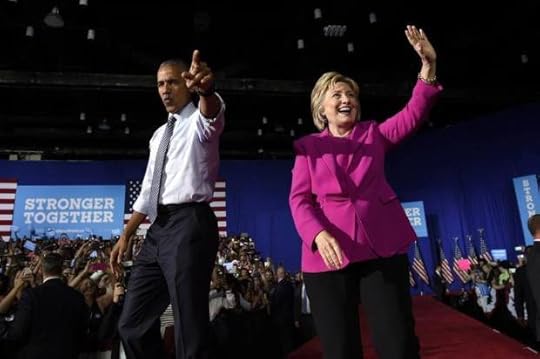
President Barack Obama and Hillary Clinton campaigning in Charlotte, N.C., Tuesday, July 5, 2016. (Credit: Susan Walsh - Associated Press)
Hours after the FBI’s surprise announcement that it would not recommend criminal charges against Hillary Clinton for her use of a private email server while at the State Department, President Obama hit the campaign trail on her behalf for the first time.
Obama and Clinton made their first joint campaign appearance of the 2016 presidential campaign at a rally in Charlotte, North Carolina, Tuesday. And it wasn’t just the timing that made the tandem Obama-Clinton event remarkable. According to NPR, no sitting president has campaigned as vigoursly for his chosen successor in 100 years. At her rally, Obama’s passion for Clinton and her campaign — hours after FBI Director James Comey called her handling of classified information while secretary of state “extremely careless” — was on full display.
“We stand together because we know we are stronger together,” Clinton said, explaining how the two former competitors went on to work together. “In America, we put common interest above self interest.”
The duo flew to Charlotte together on Air Force One, they rode to the rally together in Obama’s armored limousine, known as “The Beast,” and Obama brought along his presidential seal for the podium he shared with Clinton. Obama and Clinton originally planned to make their first campaign appearance together in Wisconsin, but the June 15 rally was postponed due to the mass shooting at an Orlando nightclub. Despite the awkward timing of the rescheduled pairing, neither Clinton nor Obama made mention of the FBI’s investigation.
“Not only did, I think, she impress me during the campaign, but she frankly really impressed me in terms of how she handled the loss of that primary,” the president explained after being introduced by his former secretary of state, who lavished her former boss with the “credit” she said has been unfairly withheld from him. “She was a trouper. She came on board, started campaigning with me almost immediately, worked tirelessly.”
“Can I be blunt,” an energetic Obama asked the equally riled up crowd. “Hillary’s got her share of critics. That’s what happens when you’ve been in the arena.”
“I can tell you this, Hillary Clinton has been tested,” he continued, intermittently interrupted by the cheering crowd. “There has never been any man or woman more qualified for this office.”
“I am here to tell you that the truth is nobody fully understands the challenges of the job of president until you’ve actually sat at that desk,” Obama said. “Everybody’s got an opinion, but nobody actually knows the job until you’re sitting behind the desk. Everybody can tweet, but nobody actually knows what it takes to do the job until you sit behind the desk,” he said, joking that his daughter, Sasha, tweets without expectations of taking the White House.
Although he never mentioned Donald Trump’s name, Obama argued against politicians who promise a return to “some imaginary past.”
“The other side has got nothing to offer you,” the president insisted. “If your concern is working people, then this election is not a choice.”
Watch the latest video at video.foxnews.com
In a video released earlier in the day, Obama further laid out the case for Clinton.
“She fought for human rights, she fought for democracy, she tried to avoid conflicts through diplomacy,” Obama said, as images of Clinton reviewing papers in the situation room on the night of the Osama bin Laden raid flashed across the screen. “When I consider what I’ve learned over the last seven and a half years, this job ultimately is not about making fancy speeches. It’s not ultimately about public appearances. It’s about when nobody’s watching and you’re alone or in a small group of people and you’re making really tough decisions, do you have somebody who’s steady? Do you have somebody who has done their homework? It’s got to be somebody who recognizes that we all have a part to play. And that’s something I’m absolutely convinced Hillary Clinton can do. It’s one of the reasons I’m sure she can be an outstanding president.”
In a new interview, @POTUS talks about why Hillary has everything it takes to be president.https://t.co/MRwg5h0LMq — Hillary Clinton (@HillaryClinton) July 5, 2016
Five great live albums: From Otis Redding to Built to Spill
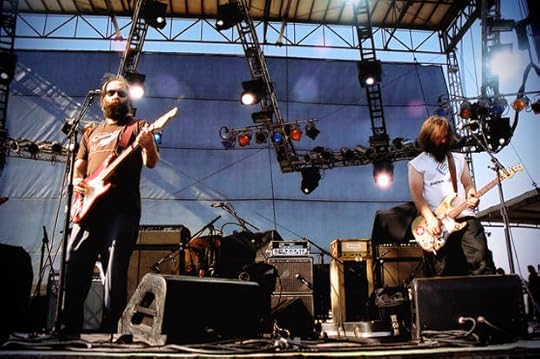
Built To Spill (Credit: Wikimedia/Josh Rhinehart)
Even after the Brexit vote, Great Britain’s NME retains much of its status as a sterling guide to rock music. (Of course, we’ve yet to see how British rock music stands up to the touring difficulties likely to arrive after the divorce is complete.) The magazine’s new list of the 50 best live albums is a good one, covering recordings by Wilco (“Kicking Television: Live in Chicago”), The Band and friends (“The Last Waltz”), Talking Heads (“Stop Making Sense”), Joni Mitchell (“Miles of Aisles”), and Belle & Sebastian (“If You’re Feeling Sinister: Live at the Barbican”).
Even with a good batch of 50, the list has some holes. I’ll overlook, for instance, the omission of the entire genre of jazz: It’s fine if the NME wants to include only musicians from the greater rock world, but it’s sad not to see recordings by artists like Charles Mingus, John Coltrane, or Thelonious Monk here.
And the proportion of classic rock artists compared to indie and alternative musicians is surprising given the way the NME’s taste tends to lean. But the live album was in a lot of ways a classic-rock artifact: Bands that came after often did not record them, they didn’t sell particularly well when they did, and even if you prefer the Smiths to the Who, it’s hard to argue that “Rank” is better than “Live at Leeds.” (There are, of course, exceptions, like Nirvana’s sublime “Unplugged in New York,” which tops the list.)
Here are a few that belong here. I’m leaving off Dylan’s Manchester 1966 concert on the assumption that anyone who’s reading this has it. (But if I’m wrong, walk don’t run.)
The Velvet Underground, “1969: Velvet Underground Live With Lou Reed”
The NME includes the New York group’s “Live at Max’s Kansas City,” which is a good, hard-rocking album recorded at the clubhouse of the Warhol crowd. It’s also one of the band’s very last live shows.
But for the graceful, crafted side of VU – the side that’s overlooked when we describe the group as radical, violently transgressive outlaws – check out this one. It includes drummer Mo Tucker, who sat out the Max’s set because she was pregnant.
Much of these Dallas and San Francisco dates show a more gentle and melodic side of the band, with extra verses and bridges in some songs (“Sweet Jane,” “Lisa Says”) and a few numbers not recorded on any of their studio albums (“Over You,” “Sweet Bonnie Brown.”) And the version of “What Goes On” absolutely rocks.
Otis Redding, “In Person at the Whisky a Go Go”
For a long time, “Otis Live in Europe” was considered the great Redding Live album and maybe the great live soul record. It’s got Booker T and the MGs backing Redding, and it’s a powerful, emotionally open-hearted concert no matter how you slice it.
But Redding’s 1966 show at the Whisky – which opens with “I Can’t Turn you Loose” and concludes with “Respect” – wins out by a slight margin. It’s a more intimate performance – and the recording is significantly better than the muffled European album. Anyone who likes this should find Sam Cook’s “Live at the Harlem Square Club” as well. (Anyone who doesn’t like this clearly does not like soul music.)
Townes Van Zandt, “Rear View Mirror”
The Dylanesque country-folk musician could write and sing dark, dejected songs better than just about anyone. Many would pick “Live at the Old Quarter, Houston, Texas” as his best album, and its two discs include memorable solo-acoustic performances and some wonderfully rambling banter.
But a lesser-known recording, “Rear View Mirror,” is my pick for best Van Zandt album, live or otherwise. It includes some of his finest songs – “Pancho and Lefty,” “For the Sake of the Song,” “To Live’s to Fly,” “Tecumseh Valley” – with lovely fingerpicking by the singer along with a second guitar and fiddle to provide counterpoint. The sad beauty of these songs has rarely been drawn out so perfectly.
James Brown, “Live at the Apollo, Vol. II”
With all the worthy artists to choose from, the NME’s editors probably did not want to include any musician twice. It’s a good policy, generally, but Brown was such a titan, especially live, that it’s hard to keep him to just one. The NME list includes the original, 1962 “Live at the Apollo,” which is a masterpiece. It may be the best live album, in any genre, ever.
But nearly as good is the sequel, recorded in 1967 with the Famous Flames and released the following year. It now exists as a two-CD album that includes a wistful “I Wanna Be Around,” a stretched-out “It’s a Man’s Man’s Man’s World,” a few early hits like “Try Me,” a heartbreaking “Prisoner of Love,” and a version of “That’s Life” that even better than Sinatra’s.
Built to Spill, “Live”
With the shortage of great live albums from indie bands, it makes sense that the real standout is one by a group that captures some of the grandeur of classic rock while avoiding its clichés. Built to Spill, which draws from bits of prog-rock and hasn’t given up on the idea of the guitar hero, released an almost perfect live album here: Beautifully recorded, played with enormous energy, it’s also a bit eccentric. Rather than tell the whole story of the band, it includes only nine songs, three by other artists (Love as Laughter, Neil Young, and the Doug Martsch-associated Halo Benders.)
The album ends with a nineteen-minute version of “Broken Chairs,” one of the group’s great showcases for both melancholy and force. But it’s the 20-minute version of Neil’s “Cortez the Killer,” which build and builds, that may be the best thing Built to Spill has ever recorded.
No charges, but still plenty of questions: 3 big takeaways from FBI’s announcement on Hillary’s emails
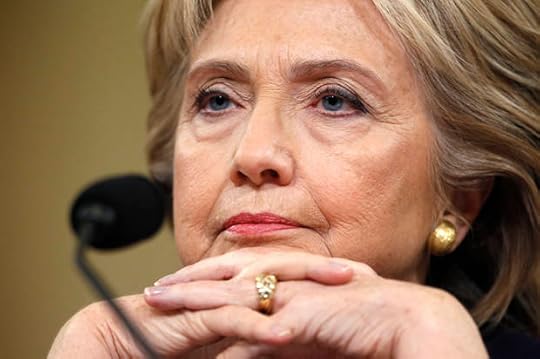
(Credit: Reuters/Jonathan Ernst)
FBI Director James Comey announced Tuesday that the FBI would not recommend charges against Hillary Clinton stemming from her use of a private email server while serving as secretary of state. Though Comey was sharply critical of Clinton and her staff, calling their conduct “extremely careless,” he said that, based on the FBI’s investigation, bringing charges would be inappropriate and that “no reasonable prosecutor” would elect to indict Clinton.
Attorney General Loretta Lynch said last week that the Department of Justice would accept the FBI’s recommendation about whether to bring charges, meaning that Clinton’s presidential campaign is likely to continue unencumbered by the spectre of potential criminal charges related to her handling of classified information on the personal server.
Though Comey’s press conference was most notable for what it lacked — a recommendation to prosecute — the FBI director’s remarks did contain a number of revealing and potentially consequential bits of information.
1. Clinton’s main talking point on the email scandal is false.
Clinton has said throughout the FBI’s investigation — and as recently as last week — that while using her private server she “did not send nor receive information that was marked classified at the time.”
Comey’s statement contradicted Clinton’s claim in no uncertain terms: “From the group of 30,000 emails returned to the State Department in 2014, 110 emails in 52 email chains have been determined by the owning agency to contain classified information at the time they were sent or received. Eight of those chains contained information that was ‘top secret’ at the time they were sent. Thirty-six of those chains contained ‘secret’ information at the time, and eight contained ‘confidential’ information at the time.”
Note that Clinton’s statement refers to information “marked” classified, while Comey’s does not. As Politifact pointed out recently, Clinton’s phrasing was revealing because, under scrutiny, it left open the possibility that Clinton’s emails might have included information that was classified but inappropriately left unmarked. This appears to have been the case with the majority of the 110 classified emails Comey referenced.
“Only a very small number of the emails here containing classified information bore markings that indicated the presence of classified information,” Comey explained. “But even if information is not marked classified in an email, participants who know, or should know, that the subject matter is classified are still obligated to protect it.”
Comey did not elaborate on the “very small number” of Clinton’s emails that bore classified markings (as opposed to emails that contained classified information not marked as such), but his statement indicates that at least some of the emails on Clinton’s private server contained information marked classified at the time they were sent or received. If this is the case, it renders Clinton’s claim false even by a legalistic standard.
2. The FBI isn’t really sure how much Clinton didn’t hand over from her private server
Before Clinton handed over 30,000 work-related emails from her private server to the State Department in 2014, her lawyers deleted roughly 30,000 other emails containing information they deemed personal in nature. After this process was complete, Comey explained, Clinton’s lawyers “then cleaned their devices in such a way as to preclude complete forensic recovery.”
“I have provided all of my work-related emails,” Clinton told ABC News in May. The FBI’s investigation revealed that, knowingly or not, a significant number of Clinton’s work-related emails were not actually handed over by her staff.
Comey explained that in the course of its investigation, the FBI was able to recover “several thousand” work-related emails that were not among the 30,000 that Clinton and her staff produced to the State department in 2014, three of which contained information that was classified at the time they were sent. Comey said it is “highly likely” that additional work-related emails were deleted by Clinton’s lawyers but not subsequently recovered by the FBI.
Though Comey said that the FBI has “no evidence that any of the additional work-related emails were intentionally deleted in an effort to conceal them in some way,” his remarks revealed that the FBI’s investigation lacked “complete visibility” because it relied so heavily on the sorting process employed by Clinton’s lawyers. That is to say, the FBI acknowledges the existence of what Donald Rumsfeld might refer to as “known unknowns” in its investigation.
3. The FBI doesn’t know if Clinton’s personal server was hacked
Critics have long claimed that the Clinton’s use of a private email server unprotected by government security standards put classified information at risk of being accessed by foreign states or actors.
“In my opinion there is a 100% chance that all emails sent and received by her, including all the electronic correspondence stored on her server in her Chappaqua residence, were targeted and collected by the Russian equivalent of NSA,” a former CIA case officer told the Associated Press last summer.
Comey said that while the FBI “did not find direct evidence” that hostile actors had successfully hacked Clinton’s email, the bureau would be unlikely to find such evidence even if a breach had occurred.
The FBI found that Clinton’s use of a private domain was widely known and that hackers had accessed the private email accounts of people with whom Clinton regularly communicated using her private email account.
“She also used her personal e-mail extensively while outside of the United States, including sending and receiving work-related emails in the territory of sophisticated adversaries,” Comey said. “Given that combination of factors, we assess it is possible that hostile actors gained access to Secretary Clinton’s personal email account.”
Snoop Dogg to headline Democratic National Convention “unity party”
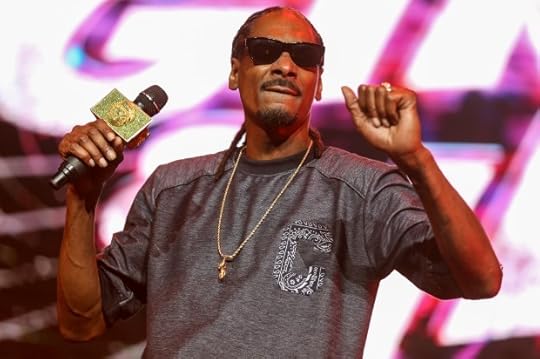
(Credit: Rich Fury/invision/ap)
Snoop Dogg (f.k.a. Snoop Lion, f.k.a. Calvin Broadus) will be headlining a “unity party” to cap off the Democratic National Convention this month, according to Politico.
The event — co-hosted by Democratic super PACs Priorities PAC, the House Majority PAC, and the Senate Majority PAC — is set to take place on July 28, the final night of the Convention in Philadelphia.
Los Lobos, meanwhile, will perform at the Convention earlier in the week, according to Politico.
Not to be outdone, an unofficial Kid Rock concert at the Quicken Loans Arena in Cleveland is scheduled for July 21, during the final night of the Republican National Convention.
Like the Democrats’, the Republican convention will no doubt be contentious, with an ever-widening rift between the moderate Kid Rock wing of the party and the gun-toting outsiders among Ted Nugent’s caucus.
Matt Damon on gun control: “We cannot talk about it sensibly”
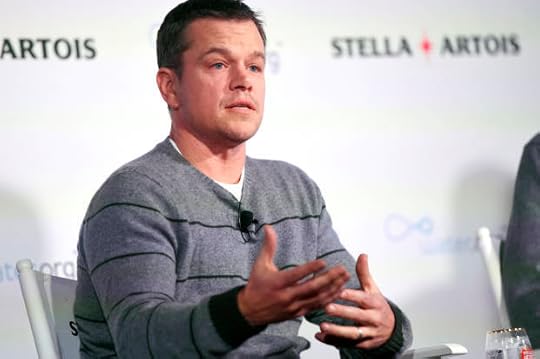
(Credit: Chris Pizzello/invision/ap)
Another “Bourne” iteration means another press junket for the series’ star Matt Damon.
While promoting “Jason Bourne” — the fifth film in the series — in Sydney, Australia, Damon was asked about the United States’ repeated failed attempts to regulate the sale of high-capacity firearms.
“You guys did it here in one fell swoop and I wish that could happen in my country, but it’s such a personal issue for people that we cannot talk about it sensibly,” Damon told Stuff.co.nz, a New Zealand-based new site. “People get so emotional that even when you make a suggestion about not selling AK47s to people on terror watch lists, that’s a non-starter. I don’t know what needs to happen.”
He continued:
“Obviously mass shootings aren’t going to do it. There have been so many of them at this point. Sandy Hook, when those children were murdered, if that didn’t do it, you know, I just don’t know. Maybe we just need to evolve further before we can have that conversation, I don’t know.
“It’s wonderful what Australia did because you guys haven’t had a mass shooting since you went, ‘No, we’re going to be sensible about this.’ And nobody’s rights have been infringed, you guys are fine.
“I wish we could be sensible like that but I don’t think that’s going to happen in my lifetime.”
Read the full story at Stuff.co.nz.
Pay attention, America: Donald Trump and the lessons of Brexit
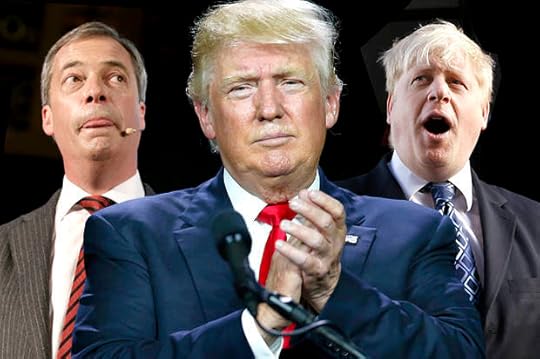
Nigel Farage, Donald Trump, Boris Johnson (Credit: AP/Kirsty Wigglesworth/David Zalubowski/Photo montage by Salon)
It all happened so fast. Less than five months ago, British Prime Minister David Cameron announced that the UK would hold a referendum on whether to remain in the European Union. Cameron was a weak leader who was ensnared by his right-wing antagonists. He had a persuasive case to make but failed to do so. Rather than win the argument, he agreed to hold a referendum without considering the full implications of that vote. Now Britain’s political future is as uncertain as its been since the WWII period.
There were many forces behind Britain’s Leave campaign, but two leaders stand out: Boris Johnson, the former mayor of London, and Nigel Farage, the former leader of the UK Independence Party. Expert demagogues, they whipped working class voters into a frenzy, stoking racial resentment and inventing crises at every turn. They exaggerated the threats, misrepresented the facts, and exploited economic angst.
Confused and angry, British voters took the bait. They opted to leave the European Union, believing they were “taking their country back.” But no one really explained what that meant. Amid the paroxysms of rage, voters forgot to ask tough questions like “What is the European Union?” or “What are the implications of leaving it for England?” Indeed, Google reported that these were two of the most popular search phrases in Britain after the polls closed. Only now are voters learning that their financial markets are in turmoil, their pound is plummeting, and that most of the claims made by Brexit proponents were spurious. As The New York Times reported, pro-Leave politicians are already backtracking on the many false promises made during campaign. “A lot of things were said in advance of this referendum that we might want to think about again,” said Liam Fox, a former cabinet minister. Translation: we lied about the problems and therefore the solutions we proposed aren’t applicable.
Now the ship has sailed and people are scrambling to make sense of it.
If they’re looking for help on that front, they won’t get it from Johnson or Farage. Both men have promptly abandoned their posts. Johnson pulled out of the race to become Britain’s prime minister. He bowed to fellow conservative, Michael Grove, who saw no use for Johnson’s substance-free demagoguery now that the referendum has concluded. As for Farage, he has slithered back into retirement following the Brexit campaign. “During the referendum, I said I wanted my country back,” he remarked on Monday, “now I want my life back.” Having achieved his ambition of destroying Britain’s ties to the rest of Europe, his work is done. But the disaster he and Johnson helped create is just beginning. It falls to others to pick up the pieces, to navigate the enormous economic challenges ahead.
The Brexit supporters followed their “leaders” into an abyss. They were sold a bill of goods and once the checks were cashed, there was no one on the other line to greet them. This ought to sound familiar to American voters. What happened in Britain can – and in many ways is – happening here. Trump is following the same playbook as Johnson and Farage. Unlike Johnson and Farage, who at least have meaningful political experience, Trump is merely a brand, applying his marketing techniques to a political process long governed by the laws of public relations. Tactically, though, he’s playing upon the same grievances.
A campaign built purely on nativism can go a long way in American politics, but not this far. Trump understands that people have lost faith in governing authorities. The “establishment” is just a catch-all term for the elites and technocrats running the country. This is a system in which people no longer feel invested. It’s an inert system, born of greed and divorced from the citizenry. The role of a firebrand like Trump is to issue vague promises while giving the discontents a bogeyman to blame (immigrants, refugees, Muslims, etc.). This is what Johnson and Farage did in Britain and it’s what Trump has been doing since he launched his presidential campaign. It probably won’t win him the White House, but it has ruined a major political party and brought the country to a precipice.
The crucial lesson to draw from the Brexit vote is that a democracy can drive itself off a cliff given the right stew of propaganda, resentment, economic uncertainty, and political corruption. It’s terrifying that millions of Americans are so blinkered by bigotry and hate that they don’t even care that Trump is openly conning them. At this point it’s about blowing up a broken system, not about the candidate himself.
But the critical question to ask is, “What comes next?” British voters failed to ask this question, and millions of Trump supporters have as well. Were Trump to win in November, his response would likely mirror his British counterparts. Beyond the bottled up rage and the rhetorical excesses, there’s nothing there – no plan, no solutions, no vision. He’s an agitator, not a leader. Given his willful ignorance on nearly every issue of consequence, there’s no reason to suppose he even wants the job. In fact, the best thing that could happen to him would be to lose the election, blame it on a rigged process, and then create a new media business with the audience he’s cultivated, a move he’s already considering according to this and other reports.
Johnson and Farage disappeared once their country was forced to reckon with the choice it made. They pulled the grenade pin and fled before the blast. What happens next is anyone’s guess. Perhaps they didn’t think they’d win. Perhaps Trump believes the same. But if he does win, his sham campaign will be exposed and the country will be stuck with the bill.
If you want to know what looks like, ask a British friend.



